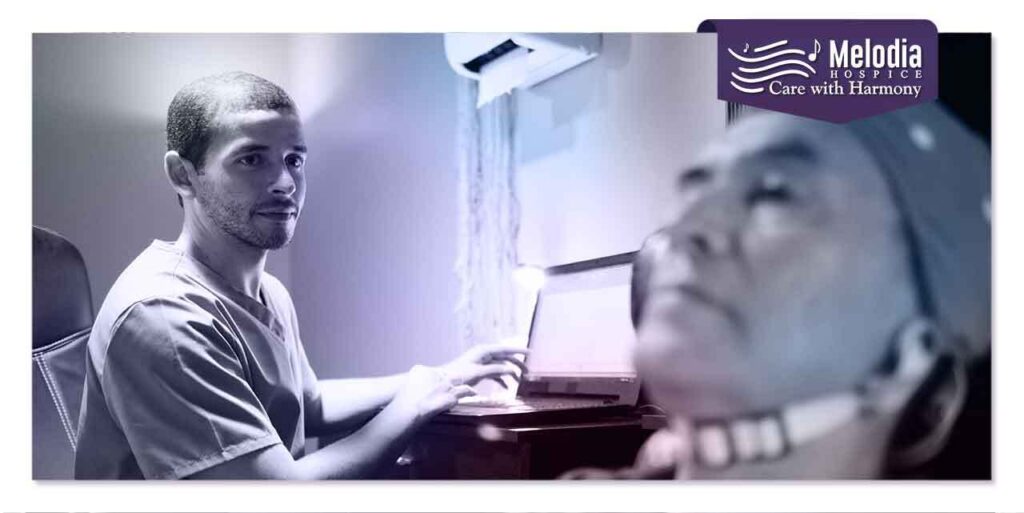A person with brain cancer may experience various symptoms that alter as the disease progresses. There is likely to be a decline that impacts the organism as a whole. There may also be an effect on a specific area of the brain or the entire brain due to the enlargement and tumor.
Different areas of the brain control distinct physiological functions. A brain tumor in an area associated with a particular part will impair that function. For instance, a tumor in an area that controls speech will damage a person’s ability to speak. These effects are among the earliest indications of brain cancer and frequently result in its diagnosis.
Hospice Care With Brain Tumor

Hospice care comforts and supports terminally ill patients. Hospice care focuses on pain and symptom management rather than treating the underlying illness.
Brain tumor prognoses and treatments depend on the type, location, stage, patient’s health, and reaction to medicine. Hospice care may be advised if the tumor progresses after surgery, radiotherapy, or chemotherapy.
Hospice patients’ medical, emotional, and spiritual needs are met by doctors, nurses, social workers, chaplains, and volunteers. They alleviate pain and other symptoms and emotionally support the patient and family.
Hospice care focuses on dignity, suffering, comfort, and emotional support for the patient and family. The hospice team will create a personalized care plan with the patient and family.
If possible, the hospice care team must be informed of the family’s and the patient’s intentions. This ensures care matches patient values and goals.
We recommend seeking help from the hospice care team and friends, relatives, or support groups that have experienced similar situations. They can guide and comfort you through this trying time. During difficult circumstances, self-care and getting support are crucial.
Hospice Timeline for Brain Tumor

A brain tumor patient’s hospice timeline can vary significantly based on several factors, including the type and stage of the tumor, the patient’s overall health, and the effectiveness of treatments.
Phases of Diagnosis and Treatment:
- The timeline begins with the brain tumor’s diagnosis. Options for treatment, including surgery, radiation therapy, chemotherapy, or a combination, will be discussed and initiated.
- The duration of this phase can vary greatly dependent on the aggressiveness of the tumor and the usefulness of the treatment. It could last between several weeks and months.
Disease Progression:
- If the treatments are successful, the patient may experience a period of remission, during which the development of the tumor is stopped or reduced. During this period, the patient’s quality of life may extensively improve.
- If the treatments are ineffective, the tumor may continue to grow or return, causing the disease to progress. Depending on various variables, this phase could last from a few months to several years.
Hospice Care:
- As the condition progresses, doctors and families may consider hospice. Hospice care helps terminally ill patients live better.
- Hospice begins when the prognosis is less than six months. Depending on the patient’s health, hospice may be suggested.
End-of-Life Phase:
- As the patient’s health declines, the focus switches to pain management, symptom relief, and family support.
- The end-of-life period might last weeks or months, making it hard to predict.
- The above timeline is a broad timeline that may only apply to some. Some brain tumor patients grow faster or slower than others.
To provide the best care and comfort for the patient and their loved ones, it’s essential to communicate openly and honestly with healthcare experts, hospice staff, and support networks during this difficult time.
What Signs and Symptoms Indicate Brain Tumor Patients Are Nearing the End of Their Lives?

Brain tumor deaths usually happen gradually. The tumor’s growth and enlargement may induce paralysis, loss of consciousness, problems swallowing, convulsions, and dizziness. There are signs that death may be near:
Constant alterations in vital signs: Changes in blood pressure, heart rate, and respiration may or may not be noticeable to family members and medical personnel. These modifications may occur over several days or even weeks.
Variations in personality or behavior: The individual may become less friendly, withdrawn, or irritable. Patients may need clarification and clarification. They may even begin using uncharacteristic language and expressing thoughts that are also notably out of character.
Activity intensity has decreased: Those nearing the end of their lifetimes frequently struggle with significant fatigue. This is due to a combination of factors, including cancer itself. These medications are commonly prescribed to address various symptoms associated with the dying process and the emotional stress of coping with the situation.
A decline in the capacity to react to one’s surroundings: Patients may appear disconnected or distracted. They may lose the ability to communicate and move independently over time, necessitating constant supervision and care.
How Can Melodia Care Assist You?
Melodia Care provides medical care for patients diagnosed with brain tumors. The focus is on relieving the stress and symptoms of a severe illness while also attending to the patient’s and family’s physical, emotional, and spiritual requirements.
Melodia Care can assist you in managing pain and other advanced illness symptoms regardless of location.
Discuss scheduling a consultation with Melodia Care with your physician, or call us, and we will contact your physician on your behalf. You can reach Melodia Care 24 hours a day, seven days a week via our 24/7 online customer support chat or by dialing 1-888-635-6347 (MELODI-7).








